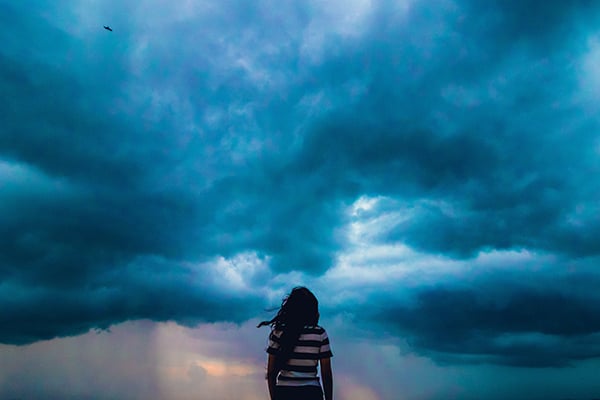“Yes, a dark time passed over this land, but now there is something like light.” ~ Dave Eggers, Zeitoun
~
I sat balled up, stomach in knots, in my parents’ living room staring at the radar as it hovered over my island home.
The eye was massive and it didn’t move all day. With sustained winds of 185 miles per hour, it was the strongest storm ever recorded in the Atlantic.
On September 6, 2017 Hurricane Irma made landfall on St. John in the United States Virgin Islands.
I was safe in New York, on vacation. I knew Irma was coming and had prepared the best that I could before I left. With my apartment boarded up, I thought my belongings would be fine.
I didn’t take my grandma’s wedding ring, my computer, important documents, photos, or my cherished books and journals in my carry-on luggage when I left for New York. I never imagined the catastrophic devastation the hurricane would bring.
Maybe you think this won’t ever happen to you. It probably won’t. But when I’ve shared my story, I’ve had people respond with their own.
One lost their home in a fire. They watched as their house burned to the ground.
Another lost her home, business, and most of her friends when she divorced from her husband.
Another friend lost their young child.
Our stories are different, but we share the language of loss and the struggle to come out the other side.
Although trauma and the process of grief varies just as much as our stories, there were some things that helped me get my life back to normal, one step at a time.
1. Focus on your daily quality of life.
Do whatever you need to make life feel the tiniest bit more okay.
For me it was taking care of my pup. From the moment we got on the plane together to fly back to the States, I was so worried that I couldn’t stop crying. I tried to focus on smiling at her and giving her lots of love. I made a big fuss over her new bed and gave her lots of treats.
I took her to the ocean where she’d run her island pup heart out and wag her tail. Those long walks down vast ocean beaches helped bring me back to myself.
I also slept late into the morning and got up slowly. I took my time waking up, drinking coffee and reading my book before interacting with the rest of the world.
Take the time. Sleep, eat comfort food, cry, be alone, blast music, go on social media, or unplug. Whatever makes you feel better—whatever better means to you at that moment.
2. Utilize any (sup)port in a storm.
Each time someone in New York asked, “Are you planning to go back?” I was faced with the reality that I had no belongings, car, or job to go back to.
I relied on my friends and loved ones back on St. John—friends who, like me, left before the storm; people who knew how catastrophic the changes were, and sometimes were the only ones who could understand the complexities of how I felt. When the coconut telegraph, or island word-of-mouth, wasn’t working after the storm, we created multiple Facebook groups to support each other and share information. We discussed feelings of relief and guilt. Our love for the island and the life we had built there wasn’t enough to save it.
When I couldn’t connect with them, I hit my recovery meetings every day, sometimes twice. It was there that I found others like myself who had been through something unimaginable and had come out the other side without drinking or using. In that safe space, I could cry or be mad at God or the Universe.
My family took me in and tried to comfort me while also giving me space. This was hard on all of us but their love and support is immeasurable.
For those without a built-in support system, there are groups on Facebook for all kinds of support. It turns out, we humans are not special snowflakes. There are many people who have been in our shoes. Therapy or therapy apps, like Talkspace can also be helpful, if needed.
The important thing is to try something that feels safe.
3. If help is offered, take it.
The best thing about humanity is the ability to come together to help someone. It may be hard to accept help after we’ve had the rug swept out from under us, but something that helped me was to think of it as helping others to feel good.
My mom started a GoFundMe while I was still in shock. A talented musician friend of mine put on a benefit show for me and another affected by the hurricane. The community came out and brought food, donations, and prizes. It felt good to have my neighbors to lean on.
Sometimes friends want to treat for coffee, or give clothing or household donations. Let them. We can always pass it on to another person in need later, and they get to clear their lives of things that no longer serve them.
4. When ready, move your body.
For a while, I stayed in my bedroom, binging shows on Netflix to pass the time and quiet my incessant monkey mind. I needed to shut the world out for a bit to get my bearings. I felt as though I had used all my energy to cry, think, and worry.
At some point, my long walks with my pup weren’t enough. When I was ready to get physical, I joined a gym.
I had so much anger bottled up inside that I felt like I was going to explode. I started throwing around kettlebells, and immediately knew I was on to something.
Sweating releases pent up anger and brings on the endorphins. Slamming medicine balls and waving heavy ropes made me feel like I was taking some of my power back.
I slipped on my new pink boxing gloves and hit the bag over and over, gritting my teeth while tears slid down my face. I was so mad that I had lost the life I’d worked so hard to create for myself. I wanted someone to blame, a place to put the anger that made sense. The truth is in an event like this there is no one to blame, and sometimes nothing makes sense. I did my best.
Bodywork—massage, reiki, yoga, or acupuncture can do wonders to get our chi, or life force, moving. Since trauma is stored in the body, anything we can do to wake it up, or move it up and out is progress.
Every time I take a yoga class, moving into Pigeon pose has me awash in tears with relief. Hit up YouTube for tons of free yoga and other body movement videos.
5. Dive into a spiritual practice. Meditate.
A spiritual practice can be anything you wish. Some gather feathers and crystals for an altar, some surf as a sacred act to be one with nature.
I read books like The Subtle Art of not Giving a Fuck, and daily readings like The Language of Letting Go. Hiking in the woods, hopping on a paddleboard, or floating in the ocean can be spiritual.
You say you can’t meditate? I say you can. Meditation is not clearing our minds of all thoughts. It doesn’t even have to be sitting still. It’s about bringing mindfulness to anything we do.
When we are being “mindful” we are bringing focused, nonjudgemental awareness to our experience.
Washing dishes meditation, walking meditation, or a sitting meditation with a class, online, or while using an app all have the same effect. I listen to podcasts of dharma talks, and join in when they lead a guided meditation from the comfort of my car, parked in front of the ocean.
7. Forgive ourselves.
Sh*t happens. It’s not our fault.
And yet, sometimes we feel guilty. I know I did. I felt bad for not being there during or after the storm. I felt guilty for not moving back to St. John. I missed my island community, but going back didn’t make sense financially or emotionally. It didn’t feel right.
When I began to practice self-compassion for the choices I made for myself, a shift occurred.
I realized how grateful I am for my hometown friends and family. I started working on some areas of my life that had needed attention for years. I dealt with long-standing health issues. I’m learning new skills and planning new adventures that would’ve never spoken to me in the life I used to have.
When life-altering events occur without warning, it would be easy enough to give up. As podcaster, writer, and all-around rad human, Nicole Antoinette says, “We can do hard things.” It may seem impossible but we can gain the resilience to keep going, however slowly.
8. Create something.
Make a collage, write a song, start a blog or YouTube channel. Print up a zine, build a sculpture, or make a podcast about something you love. Write all your angry words on paper, shove them in glass bottles, and go break them at the recycling center.
Bring something forth into the world that wouldn’t be there without this loss.
In her recent album Landfall, and art book, All the Things I Lost In the Flood, artist Laure Anderson chronicles her experience with Hurricane Sandy. From the first weather reports to the flooding of her and husband Lou Reed’s studio and the loss of many of their revered works of art, instruments, and recordings, all the way to the aftermath of the destruction, Anderson lays it all bare.
From this place of loss, she created her book and album that now takes the space of what was destroyed.
Two years after the storm, I’ve begun writing again. I completed Elephant Journal‘s Elephant Academy writing program, and find myself now a mentor who is both excited and nervous to give back some of the support I’ve received in the past several months.
Our unique experiences and tender offerings to ourselves or others have the power to connect humans on this messy, imperfect, precious journey of life. These tips have helped me survive and eventually begin to thrive again. Through them, I’ve nurtured my innate critic, my inner child, and my higher self. It is my hope that they be of benefit.
“I had the wind knocked out of me today after I picked myself back up I decided I would become the fucking hurricane instead.” ~ N.R.Hart
 Share on bsky
Share on bsky




Read 14 comments and reply